Air Purifier for Cat Hair is a lifesaver when maintaining fresh air around the house.
In addition, they remove cat hairs, dander, and allergens that could have caused allergies to your family and cats.
However, knowing the best air purifier for cat hair may be complex.
Therefore, we decided to research the best air purifiers to save you time and energy while browsing the internet.
Why do I need a pet Air Purifier?
The following are good reasons for buying a pet air purifier.
Alleviates Your Allergies
Cat owners often have pet allergies that could cause difficulty breathing, stinging eyes, coughing, and sneezing. Despite popular belief, most cat allergies are due to dander, not hair.
Air purifiers remove dander, dust mites, and pollen from the air, thus saving you from allergies.
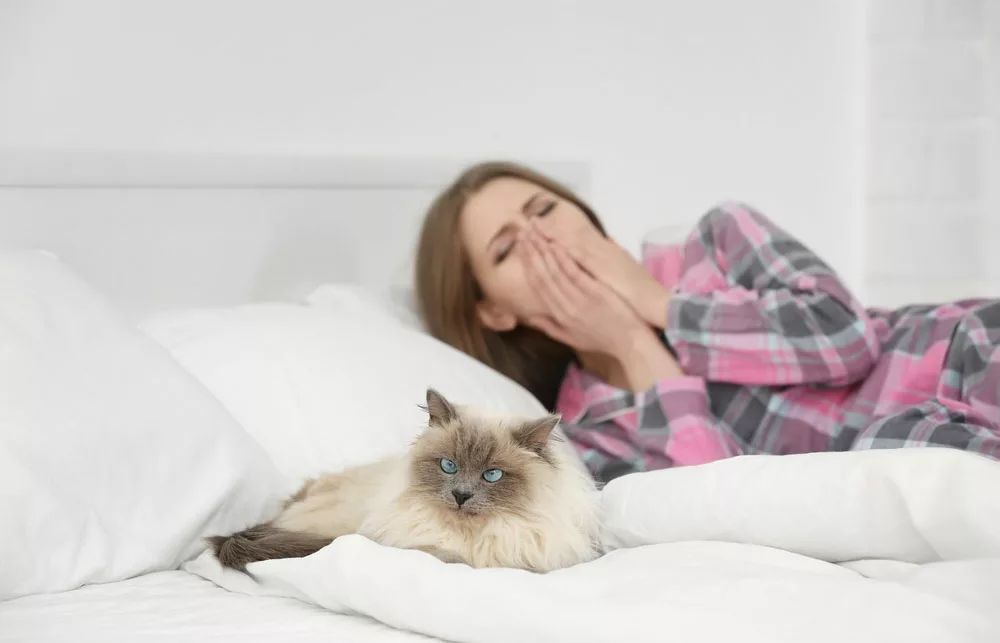
(Cat allergy)
Reduces a Cat’s Allergies
Sometimes cats can be sensitive to cat food, mildew, dust, and pollen despite their powerful appearance.
If you observe your cat constantly licking its hair, you should worry since the act suggests your pet has allergies.
Additional symptoms comprise vomiting, diarrhea, itching, and sneezing.
Using air purifiers is a good start in eliminating cat allergies, even though a visit to the veterinarian may be necessary.
Reduces Mess
While pet hair does not cause allergies, it creates a mess when fur forms clump on the furniture or carpet. Pre-filters in air purifiers often catch cat hair and keep it from reaching the surfaces and causing untidiness.
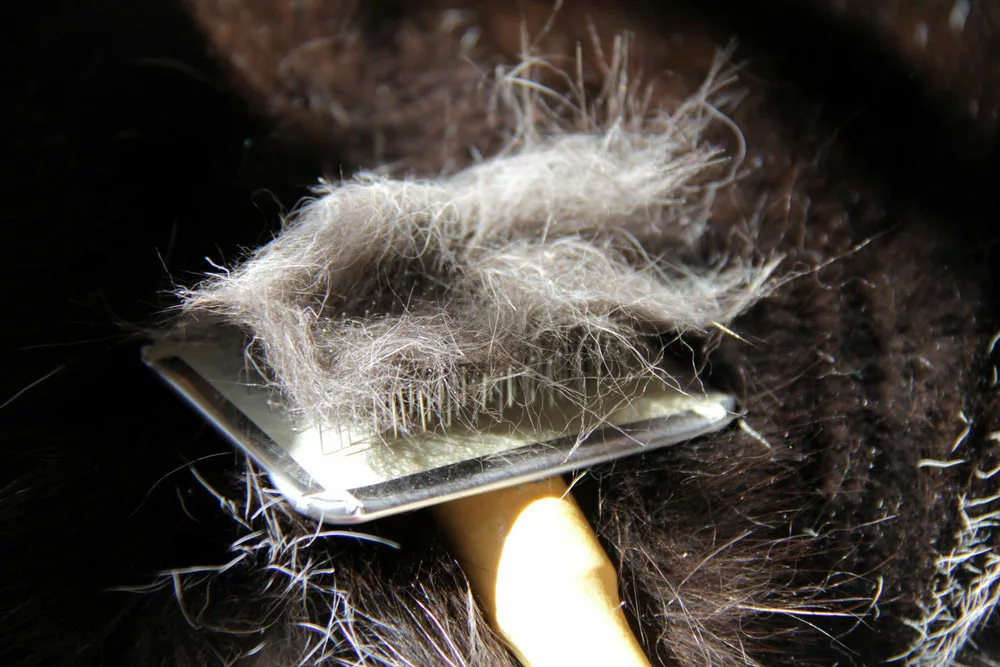
(A pile of cat hair)
Eliminates Odors
As a cat parent, odors like musty cat aroma and filthy litter pans are generally acceptable, although unnecessary.
Air purifiers such as activated carbon and HEPA filters usually remove bad household odors while eliminating smells from smoke or cooking.
- What are the different types of Air Purifiers?
Let us now go through the various types of air purifiers.
Active Air Purifiers
They include;
- UV light purifiers: UV light eliminates air pollutants, only killing microorganisms and pathogens like viruses, not allergens or cat hair.
- Ozone generators: The purifiers combine with airborne particles to generate carbon dioxide and water to cleanse the air. A large amount of ozone inhalation is equally harmful to humans, so be cautious.
- Ionizers: They release negative, positive, or a combination of both ions, which damage air molecules on binding to them, thus eliminating smells and allergies. However, they don’t destroy cat fur.
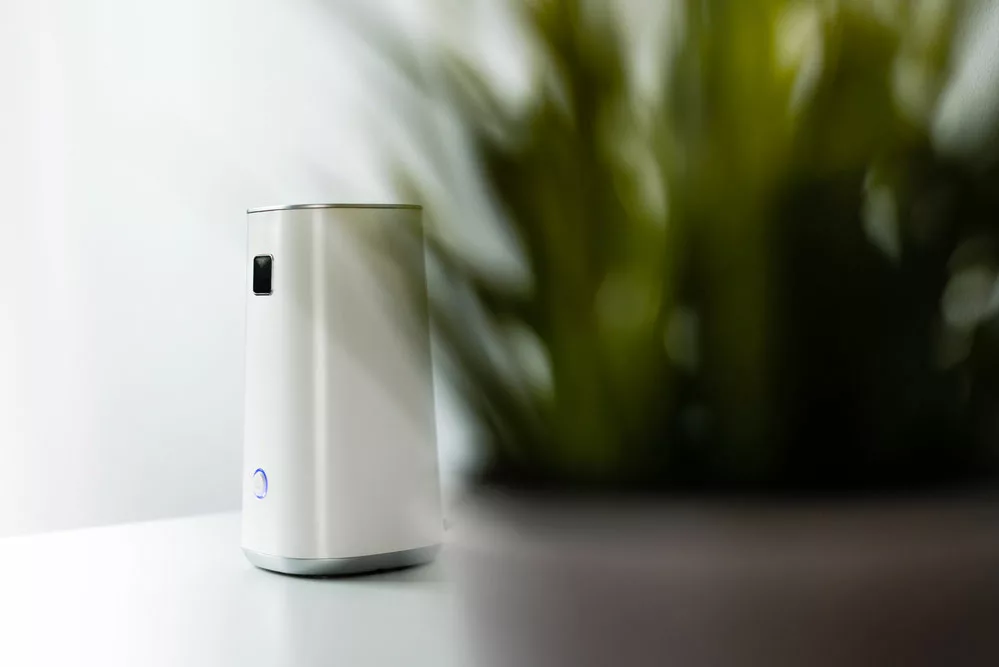
(An ionizer)
Note; While ozone generators produce harmful ozone when inhaled in large quantities, UV light purifier ionizers produce modest amounts. Therefore, active air purifiers aren’t ideal.
They are Passive Air Purifiers;
- HEPA Air Purifiers are the most effective and popular air purifiers. Their filters catch pollutants using a fiber-like substance with microscopic pores, with the True HEPA filters trapping particles as fine as 0.1 microns.
- Other Filter Types: Some air purifiers have filters made from materials like fiberglass and polyester. These filters, usually employed as pre-filters in HEPA air purifiers, allow more particles through due to their bigger pores.
- Hence, they can trap cat hair and allergens effectively.
How to Choose the Right Air Purifier for Cat Hair?
Buying the finest pet air purifier online requires several considerations. Let us look into a few.
- Noise: Loud air purifiers can cause more damage than good and terrify your cat. Find an air purifier with a decibel level equivalent to white noise or one with a sleep mode.
- Filter Type: Depending on your needs, you can settle on a filter type we discussed earlier.
- Timer settings: Air filters with timers saves money and energy and prolong the filter’s life by preventing unnecessary clog when not in use.
- Room size: Assess how often your cats spend in the room where your air purifier is. As such, larger air purifiers are ideal if the cat tends to run around in larger living areas and rooms.
- Number of Pets: More cats mean more cat dander and hair in the air, which means more purifier power. You’ll need to clean the air purifier and replace the filters regularly.
- Filter replacements: Most filters last months but still need replacing twice or once yearly. Your product selection should depend on filter availability. Therefore, inquire about replacement filter availability, frequency of change, and prices from the provider.
- Cost: Purifiers are generally expensive if you also consider the expense of replacing filters every 3–6 months. Additionally, some may have added features like stronger filters and touchscreen displays.
- Size & Mobility: Pick an air purifier that is just the appropriate size for your room to enable it to clean the air effectively. You can equally opt for portable purifiers.
- Speed And Efficiency: Manufacturers often provide CADR numbers in product descriptions to show the air filter’s speed. Often, multiple speeds and higher numbers make a cleaner more efficient.
- Additional features: They can include automatic cleaning, night mode setting, air quality display, and automatic monitoring.
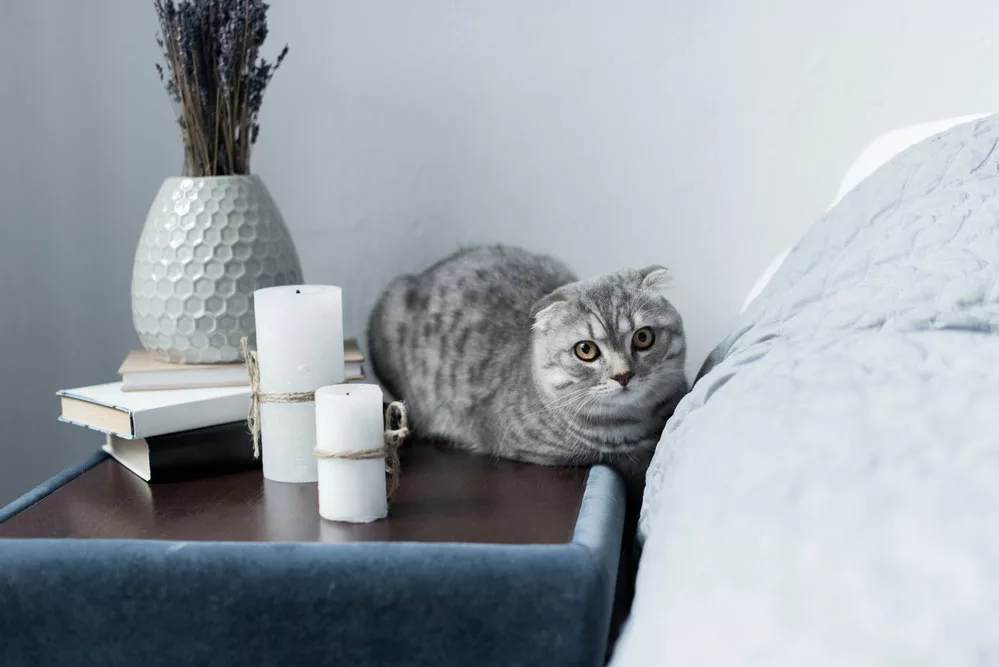
(A cat playing at home)
Six of the Best Air Purifiers for Pet Owners
Rabbit Air MinusA2 Ultra Quiet HEPA Air Purifier SPA-780A
Advantages
- First, it will capture and remove odors, allergens, dander, and pet hair with its five inbuilt filters.
- Then, you can sync it with an app for easy air quality review.
- It can also save energy due thanks to its Energy Star certification.
Disadvantage
- The installation period may take a while because it has a separate filter.
TOPPIN HEPA Air Purifier
Benefits
- First of all, it has easy portability and is compact.
- Besides having three different fan speeds, it has four distinct timer settings.
- Its sleep mode’s noise is at a maximum of 27 decibels.
- It has a child lock feature for safety purposes.
- Finally, the H13 medically graded filter has advanced four-stage filtration.
Disadvantages
- Unfortunately, it may not be ideal for large rooms.
- Also, its ionizers generate a little bit of ozone.
Pure Enrichment PureZone Portable Air Purifier
Benefits
- It works best for small rooms and is portable due to its compact design.
- Secondly, it doesn’t require a filter replacement and can effectively destroy germs and viruses.
Disadvantages
- Its UV-C does not often capture allergens and cat hair.
Alen FLEX Air Purifier for Large Rooms
Benefits
- The stylish air filter comes in eight colors.
- Furthermore, it produces pink noise that can enhance your sleep.
- It also has four different fan speeds and can clean up to 700 sq ft spaces twice every hour.
- Lastly, the H13 medically grade filter can eradicate 99.99% of bacteria and particulates.
Disadvantage
- Replacing the filter is costly.
Winix HR900 Ultimate Pet 5 True HEPA Air Purifier
Benefits
- Its pre-filter is washable to prevent it from clogging after removing cat hair.
- What’s more, it has an inbuilt sensor that measures air particles.
- It also eliminates 99.99% of particles like allergens, chemicals, and bacteria.
Disadvantages
- It is large and bulky.
Coway Airmega 400S Activated Carbon Filter Air Purifier
Benefits
- It can purify air to approximately 1560 sq ft hence suitable for large rooms.
- Despite being at the lowest speed, it can still sufficiently remove hazardous particles.
Disadvantages
- It may not fit small spaces due to its large size.
Can a Cat Survive the Cold: How Else Can I Reduce Cat Hair & Allergies?
Other than buying air purifiers, there are alternatives to preventing cat hairs and allergies.
Can a Cat Survive the Cold: Can a Cat Survive the Cold: Creating a cat-free space
If you have allergies, you may require a cat-free zone to sleep well in allergen-free air.
However, if you’re uncomfortable shutting your cat out, prevent them from laying on the bed, and regularly wash the bedding to kill the allergens present.
Can a Cat Survive the Cold: Vacuuming Regularly
As a cat owner, vacuuming your furniture, floors, and carpets is mandatory because vacuums suck up dander, cat hairs, and allergens. Remember to vacuum your cat’s favorite spots as well.
A handheld vacuum for the cat litter should suffice here.
Can a Cat Survive the Cold: Regular cat bathing and brushing
Bathing your cat using a recommended shampoo can minimize airborne cat dander and hair. However, don’t over-wash the cat since it’s naturally clean. (three to six weeks should be enough)
Furthermore, brushing your cat regularly (daily for long- and medium-haired cats and once or twice for short-haired cats) is important.
Can a Cat Survive the Cold: Hydrate your cat.
Dry skin sheds more, and this is especially visible in dehydrated cats. There are several ways to ensure your cat drinks more water to prevent shedding
- Some include using a cat water fountain instead of a dish
- , keeping their water fresh and clean
- and flavoring it using food items like bone broth.
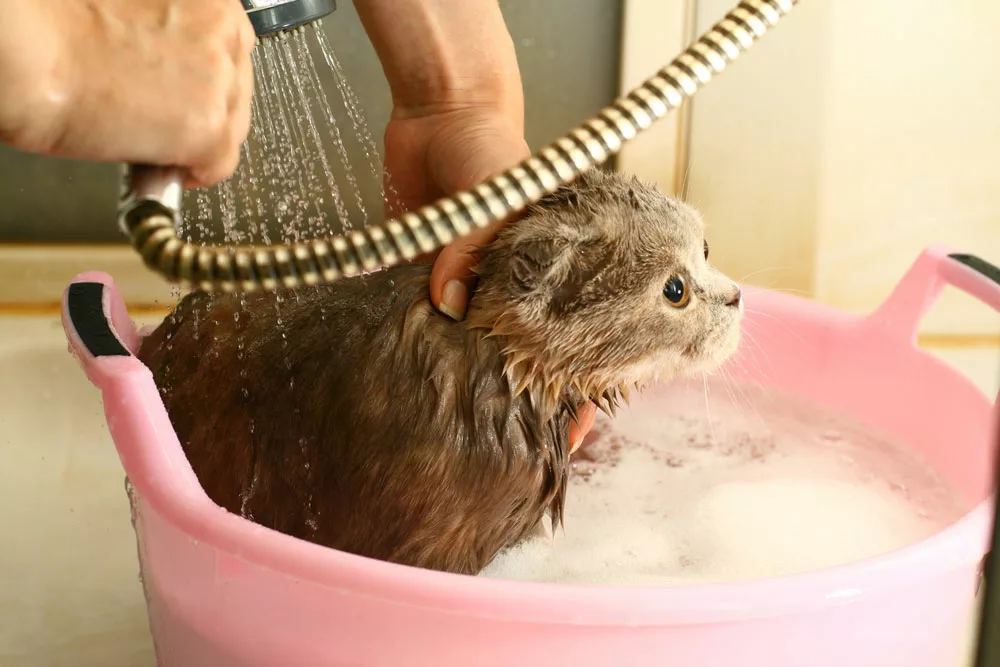
(A cat taking a bath)
Conclusion
With the above available options, your search should be easier now. However, if you still need help with cat information.
